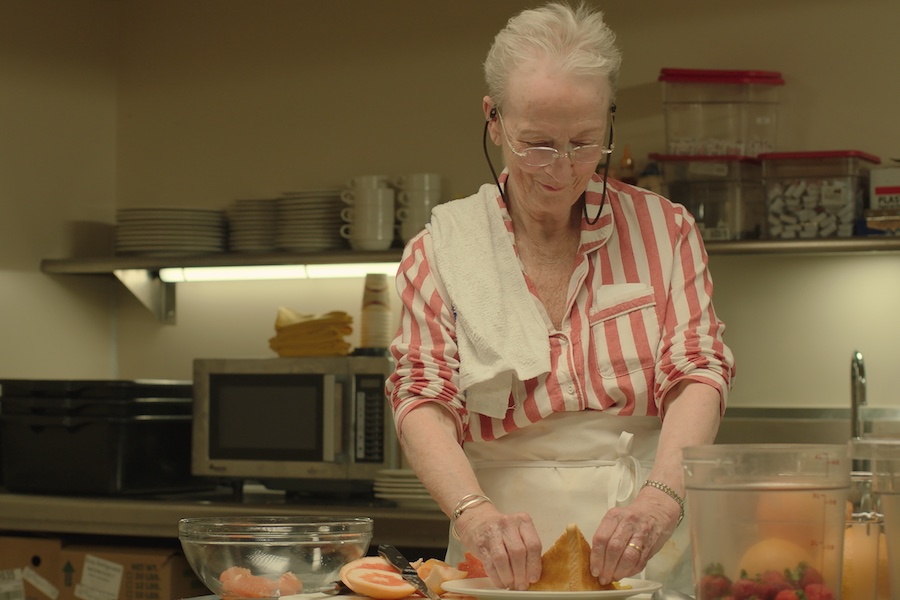Kathleen Chalfant Lends Indie Film ‘Familiar Touch’ Gravity and Grace
The actress says she hoped to honor a friend who has dementia through her performance. Her consummate acting stands as the ultimate tribute to both her friend and others experiencing memory impairment.

Deciding on whether to reside in a nursing home in old age can be a difficult decision, as is picking when to go. The new independent film “Familiar Touch” asks such questions as it tells the story of a proud elderly woman who agreed to move to an assisted living facility but, once there, cannot reconcile with her surroundings or her condition.
Shot on location at a Los Angeles retirement community and featuring a masterful central performance by Kathleen Chalfant, the picture focuses on aging and memory loss, though dementia is never mentioned directly. The result is a sensitive if slight drama that reflects its director’s debut film status.
The film’s opening scenes are its best, beginning with Ruth Goldman (Ms. Chalfant) in her home one morning. The character is shot from the back as she faces her closet, or with kitchen cabinetry looming over her, and the sense of remove and boxed-in thoughts coincide with the moment when we see her place a piece of toast on a dish rack and experience a mental lapse. Soon, a middle-aged gentleman arrives — with Ruth forgetting his name and behaving as if they were on a date — and one guesses that he is a family member or friend who is taking her to a care facility.
Upon arrival, Ruth is still under the impression that she and the man are at the facility, which admittedly looks like a better-than-decent hotel, for a secret rendezvous. The revelation that her companion is her son, Steve, is followed by a sharp denial, with Ruth stating that she never wanted to have kids. When he reminds his widowed mother that she chose the facility to be her home when the time came for long-term care, Ruth suddenly returns to full consciousness and commands him to leave so as not to “witness” what she considers a humiliation.

The segment as a whole — from her own home at the start to the drop-off at her new one — encapsulates the experiences of many older adults and their caregivers: the fluctuation between lucidity, memory problems, and denial.
Denial ties in with pride, and one of the film’s strengths is its exploration of a self-assured, even haughty individual who must accept her increasing incapacity. As Ruth starts to live at the center, it becomes clear she will not “settle in” easily. Eventually, she develops a closeness with two care workers: nurse Vanessa (Carolyn Michelle) and onsite doctor Brian (Andy McQueen). These relationships illustrate how many institutional caregivers make daily exceptions and modifications for different personalities, reflecting the hard work of eldercare and healthcare in general. There’s even a lovely moment in which the traditional relationship between caregiver and receiver is reversed.
At one point, Ruth is allowed to work in the facility’s kitchen, explaining to the staff that she used to be a cook. Food still plays an important part in her life, as we see her write down recipes as other residents are crafting, and we later learn that she also was a cookbook writer.
At times, director Sarah Friedland’s use of ingredients and food imagery feels simplistic, a convenient way of dramatizing both her lead character’s brainpower and her decline. Yet there’s nothing pat or patronizing about her depiction of Ruth’s still-strong sensuality, with the earlier flirtation with her son and her rapport with Brian suggesting both the uneasiness with which sexuality in aging adults is often met and its naturalness. This normal desire leads Ruth to attend the center’s Valentine’s Day dating event — though, instead of making a connection, it forces a reckoning with her situation and illness.
A veteran of the stage and screen, Ms. Chalfant captivates as the defiant but diminishing Ruth, with her portrayal never appearing exploitative or manipulative. In press notes, the actress speaks about how she hoped to honor a friend who has dementia through her performance. Her consummate acting, covering a range of frustrations and feelings without resorting to pity, stands as the ultimate tribute to both her friend and others experiencing memory impairment.
Ms. Friedland, who won the best director award at last year’s Venice Film Festival in its sidebar section, should also be commended for generally avoiding sentimentality, despite the story’s sad qualities. A choreographer/videographer, she was inspired to write the film’s script based on her work with seniors and having had a grandmother with dementia.
Her skill with movement shows itself in two dreamily playful sequences. Humor, too, comes through in moments, as does subtle social commentary, such as the contrast between the center’s predominantly white residents and a staff mainly made up of people of color. Some scenes, though, seem tangential and inconclusive, indicative of a novice storyteller instead of what could be seen as an attempt to mirror Ruth’s fragmented mind.
Near the end, we see son Steve (a heartbreaking H. Jon Benjamin) dancing with his mother to Dionne Warwick’s “Don’t Make Me Over,” with its lyrics reverberating through the film’s resigned final scene with ironies as well as an earnest appeal.

